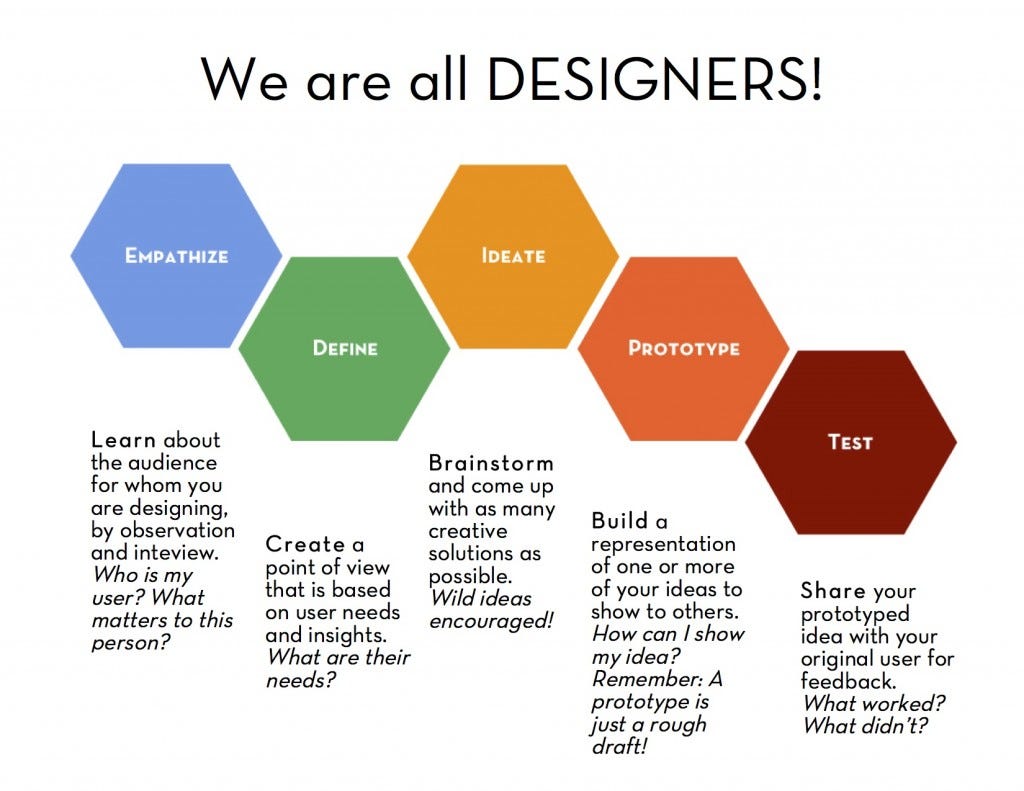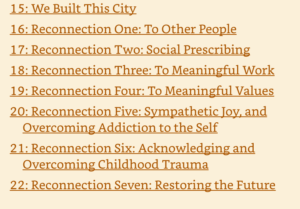Below are some articles that may supplement the issues discussed in class or expand your awareness of contemporary issues that impact the field of New Media–or conversely, trends which may themselves be impacted by changing new technologies.
Design Rubrics
Below is a visual rubric from an ideal approach to designing humane tech. These steps walk you through a process based on three stages: understand, explore, materialize so your designs really embody your values.
Rubrics for Basic Human Needs
Maslow created a chart describing the most basic needs (at the bottom) which need to be met in order for each of the higher levels to be addressed. While not a perfect model–some starving people may have loving communities–it does chart some survival priorities. Other have critiqued the model, most famously Jesus, when he said “man does not live by bread alone” .
You may want to consider and evaluate Maslow’s Hierarchy of Human Needs for the charts below. How would you amend/use these?

Is tech affecting our health?
- How Much Does Tech Mess with your Physical Health?
- 19 Negative Effects Of Technology
- How Does Technology Use Affect Men’s & Women’s Health?
- The Negative Effects of Tech
- Some Ways Tech is Making Humanity Worse
- Digital Responsibility–> Health Issues
- The Future of Well Being in a Tech Saturated World
A long PWE research study - Tech & Brain Health
- Real Effects of Tech on Health
- Is the Internet Changing the Way We Think?
- How is The Internet Changing the Way You Think?
- Do Smart Phone Make us Sick?
- The Shallows, video summary
- The Shallows, What the Internet is Doing to our Brains, Nicholas Carr
- Is the Internet Changing the Way You Think? John Brockman’s book
- Antidote to Shallows; How to Build Your Focus
Is Depression a Cultural Design Problem or Individual Pathology?
Lost Connections: Why You’re Depressed and How to Find Hope, Johan Hari
As we build more connections to tech, and tech mediated connections to people, are we losing or altering some basic non-mediated, non-tech connections. If so, does this contribute to depression. What ways of nourishing basic human needs might be considered “natural” Anti-depressants? Should we have to pay to address basic human needs? Or are these “natural” or “rights”?

A Hippocratic Oath for Designers
Challenging design professionals to view their projects as essential to human health, local economy, and ecology could result in more sustainable architecture.
While this particular “first do no harm” oath (the one doctor’s take, is designed for architects, it should have some good insights for Technology. How would you adapt it to digital technology?
Is Tech Changing How We Govern Ourselves?
Panarchy 101, or How I Learned to Stop Worrying and Love Global Collapse
The fear of collapse is understandable, but it is all too often grounded in an inability to recognize that collapse per se is only a partial truth. Collapse is coupled with emergence, and we can look from one to the other to identify the dynamics of transformation.
Amazon Employees Will Walk Out Over the Company’s Climate Change Inaction, Wired Magazine
How are workers trying to affect policy in the tech companies where they work?
Panarchy, P2P
Panarchy is a near synonym to the concept of Peer Governance, and refers to networked governance.
Is Tech Changing Our Economies?
Is Internet Great Transformer?, McKinsey
As the Internet’s evolution over the past two decades has demonstrated, such work must include helping to nurture the development of a healthy Internet ecosystem, one that boosts infrastructure and access, builds a competitive environment that benefits users and lets innovators and entrepreneurs thrive, and nurtures human capital.
The Digital Commons, Forbes
Thanks to a shared set of non-proprietary technical protocols that let different types of computers interoperate with each other, the Internet has become the largest, most robust commons in history.
Life Cycle Assessment, Wikipedia
Or, cradle-to-grave analysis)[1] is a technique to assess environmental impacts associated with all the stages of a product’s life from raw material extraction through materials processing, manufacture, distribution, use, repair and maintenance, and disposal or recycling. Designers use this process to help critique their products. LCAs can help avoid a narrow outlook on environmental concerns
Living Enterprise as the Foundation of a Generative Economy, Democracy Collaborative
While extractive investments involve casino finance, alternative approaches involve stakeholder finance, where capital becomes a partner rather than a master. Instead of commodity networks, where goods are traded based solely on price, generative economic relations are supported by ethical networks, which offer collective support for social and ecological norms.
Is Tech Changing Who We Are?
Is Tech Destroying Our Inner Lives?
Perhaps we are over-adapted to being watched, to having little left of ourselves that is not “posted,” “liked,” or “deleted.” At what point will our humanness, as we have known it, become unrecognizable to us? Or has that already occurred?
Amusing Ourselves to Death: Public Discourse in the Age of Show Business by Neil Postman
What happens when media and politics become forms of entertainment? As our world begins to look more and more like Orwell’s 1984, Neil’s Postman’s essential guide to the modern media is more relevant than ever.
The Shallows: What the Internet Is Doing to Our Brains by Nicholas Carr
Our brains, the historical and scientific evidence reveals, change in response to our experiences. The technologies we use to find, store, and share information can literally reroute our neural pathways. [are we]our capacity for concentration, contemplation, and reflection?
Why I am not going to buy a computer, Wendell Barry
This includes an interesting list of
Is Tech Changing How We Interact?
How the Internet Amplifies Our Cognitive Biases, Hackernoon
For all the greatness and freedom it brought to billions of people, by now it’s evident that ubiquitous connectivity has come with a set of major challenges. Aside from surveillance and information security issues, what I am personally mostly concerned about is how the internet reverses some of the previous achievements of reducing the aggregate harm of people’s cognitive biases on a society level. See an image of cognitive bias
The Real Reason Tech Struggles With Algorithmic Bias, Wired Magazine
Are machines racist? Are algorithms and artificial intelligence inherently prejudiced? Do Facebook, Google, and Twitter have political biases? Those answers are complicated. But if the question is whether the tech industry doing enough to address these biases, the straightforward response is no.
What effect has the Internet had on Our Sex Lives, The Guardian
The accessibility of online porn can lead to sexual enlightenment
What Teens are Learning from Online Porn, NYT
American adolescents watch much more pornography than their parents know — and it’s shaping their ideas about pleasure, power and intimacy. Can they be taught to see it more critically?
I Don’t Want to Seek Out Sex Ed Online Anymore, MS Magazine
Sex education online isn’t bad—but it would be even better if we made sure it was happening offline in every school district across the country, too.
Is Tech Changing How We Grow Up?
Growing up in a digital world: benefits and risks, The Lancet
Children and adolescents have the most to gain and are most at risk from digital technologies.
Tweens, Teens and Technology: The risks and the benefits, The Association for Child & Adolescent Mental Health
Being able to confidently support young people with their social media use in a way that promotes positive mental health and social connection…and digital ethics are becoming an increasingly significant element of nursing practice.
In Search of the Cause of Autism: How about television? Slate Magazine
The child’s brain is self-organizing in the first few years of life, and visual stimuli have much to do with how it organizes. Humans evolved while responding to three-dimensional visual stimuli. The advent of ubiquitous TV for young kids amounts to an unplanned experiment that exposes developing brains to tremendous doses of colorful, moving, two-dimensional visual stimuli. Coincident with this experiment, there has been a sharp rise in the number of children who, through autism, lose their ability to relate to the three-dimensional, normal world.
Are there Links between early age TV and Autism? Independent
Researchers at Cornell University said children prone to autism might go on to show symptoms because of environmental triggers. Watching television could be one of them.
Is Tech Changing Our Ecosystem?
The model for recycling our old smartphones is actually causing massive pollution, Vox
Millions of new iPhones will be sold this month. What really happens to the millions that get thrown out?
Someday, Apple May Make Your New iPhone Out of Pieces of Your Old iPhone, Fortune
A global electronics giant tackles the growing problem of e-waste, with the help of a recycling robot.
iWaste: The iPhone Environmental Impact, Orchard
See Apple’s new Wall-E type recycle robot
National Geographic Waste Report, National Geographic
Student Design Ideas
VIDEOS
Bodies
Culture
Earth


You must be logged in to post a comment.